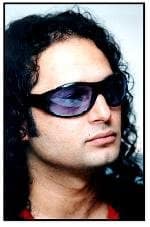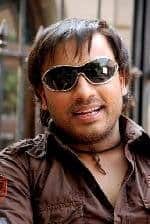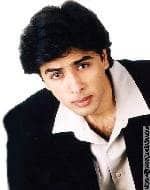Aamir Zaki Pakistani Pop Singer
Aamir Zaki is one of Pakistan’s most prolific guitar players. Zaki released his long awaited debut album Signature in 1995. To date, it is his only full length studio recording release. Zaki also played briefly with the Vital Signs circa 1994.
Zaki started playing music at the age of thirteen and has still stuck to his guns. His obsessive nature has ensured a constant flux of music from him, though both hell and high water have come his way. The story began when his grandfather started playing some ethnic string instrument, left home and disappeared for good. Though Zaki is traceable, he tends to meander like some mad man in the music that plays incessantly in his head. It has to be genetic inheritance.
Zaki’s travails into cascades and cadences had somewhat of a rocky start. His father initially got him a drum kit that was deemed too loud. A saxophone took its place, but the trumpeting was too much for the family to handle. Finally a compromise was struck on the guitar and that suited everyone just fine, especially Aamir who immediately started working out melodies on one string. Soon he had learnt the ropes by instinct, playing the music others made before him.
Playing alone soon got boring for young Zaki, so he started jammin’ with a friend who played the drums. The drummer is now a cab driver in New York; hardly glorious, but he probably earns more than what he would have as a musician in Pakistan. However, the short time that they played together was enough for Zaki to start a band called Drug Enforcement. In 1984, they played their first show at Rangoonwala Hall where they scandalized the audience by doing covers of The Who, Cream and Jimi Hendrix. The line up consisted of Salman Habib on drums, who eventually gave up drumming for Habib Oil Mills, and Abbas Premjee, who went on to the States to study, amongst other things, classical guitar. Apparently, Premjee still plays a mean flamenco, but can he match his counterpart who followed his heart?
The first musician to recognise Zaki as a teenage prodigy was Alamgir, who got in touch with him to tour India, Dubai, England and the U.S.A. It was the first time Zaki got a taste of money. They had a rather bizarre system of payment in those days. When musicians performed out of Karachi (within Pakistan) they were paid double of what they were paid in Karachi; when they performed out of Pakistan, they were paid double of this. After touring Zaki played on two of Alamgir’s albums whose names he can’t remember, but he does remember playing guitar on the songs “Keh De Na” and “Albela Rahi”.
Post-Alamgir, Zaki formed three rock groups in quick succession: The Barbarians, Axe Attack and then Scratch. Axe Attack was the only band that made an album called “The Bomb” whose title track was about the Bohri Bazaar bomb blast. It was the first English album recorded in Pakistan and perhaps for that reason, all music companies refused to release it. However, some years later, the rhythm guitarist, Nadeem Ishtiaq took it to Australia where some songs somehow made it to the radio. Back in Pakistan, the album lay forgotten and the frustrated band disbanded and Zaki was once again on his own.
The advent of Zaki in his twenties, away from the spectacular. His father died and he looked after his family business from the export of local handicrafts. Two years later he’d had enough. Out of the frying pan into the fire as the saying goes, by marriage, and divorced another two years later. It was an emotional wreck, and took it off for the U.S., where he spent all his money in Las Vegas.
A poet said “Our sweetest songs tell of our saddest thoughts”, and on his return, Zaki found enough inspiration to start composing his first (and to date, only) solo album – “Signature”. It featured one Urdu song, two English songs and the rest were instrumentals. He put his own money into releasing this high-risk venture. He produced the CDs in England and got Sonic to release them locally. This behind him, he got cracking.
The next year Zaki toured extensively with Vital Signs the grand-daddies of Pakistani pop and played on their album “Aitebar” as well as an unplugged album. Then, for a period for two years, he did absolutely nothing. The offers didn’t encite him, the talent didn’t excite him, he went into a shell till his landlord knocked on his door and asked for the rent. It brought Zaki down from cloud nine. He started playing with Awaz after their guitarist Assad Ahmed left them for hard rock odyssey with Karavan. Ostensibly, Zaki would follow suit after some concerts and no albums. Sure enough once he discovered that there was good money to be made by doing small shows with his kind of music he left the band. He played at the Karajazz Festival and many a time at Cafe Blue (Karachi, Pakistan) that marvellous haunt for live music lovers, which has now gone to the dogs. It was here that his listeners turned up week afer week to hear him play. His bass playing shone on these occasions. Zaki plays the bass like the guitar and the sounds he elicits from it are unlike anything you’ve heard before. No wonder a man in the audience shouted “spank the bass” repeatedly.
Sadly enough, despite being the most accomplished guitarist in the country and definitely the best musician in the pop/rock brigade, Zaki has come out with only one solo album. That is because he refuses to compromise on the music he makes. He maintains that there is no bass player or drummer competent enough to play with him, except Gumby, who has chosen to float along the mainstream tide with Junoon. Hear Zaki play and you will agree with him. He has the capacity to make any instrument emote. Zaki’s guitar can make it wail or strum a sweet melody with equal ease. Zaki’s tragedy is that he is some light years beyond the local music scene.
Come 2001 A.D and Aamir Zaki seems to have found his niche. Last year, he set up a recording company called Manhattan West Productions in Santa Monica, California with a partner. He is back with the intention of getting talented musicians out of here. Zaki has turned producer and has three albums up his sleeve: an Asian Pop Collection featuring the likes of Indian girl band Sansara, a fusion album with Hamid Ali Khan and two American singers and his next solo album that he has composed and played on by himself. He is also doing an English album with Hadiqa Kiyani and is producing two songs for Ali Azmat’s upcoming solo album. It is a chance for him to make money. Zaki can be a commercial session player, but his own music has never been commercial. Once his plans are in full swing, he will probably take up Zakir Hussain’s offer to play with him in England. Knowing Zaki ideals, he might even drop his production plans to do that.
Now it remains to be seen if Zaki can take the bull by its horns and come out on top. Currently Zaki is working as a guitar teacher in a government funded Music & Acting School.
The Institute’s, which is called NAPA ( National Academy of Performing Arts ), couldn’t keep him for long, and he left after staying for about a year. He stayed in Canada for about a year or so, and came back recently to karachi. It has been a long time since we heard anything coming from him, as the last song on screen was with Hadiqa Kiani “Is baar milo”. Lets see if he is back with some surprise or not.
Interview
He is the greatest modern musician of this country, and perhaps beyond. To him, the issue of genre rarely comes up as jazz, the blues, rock, pop, bhangra, semi-classical and countless other forms all melt away into a sonic mural painted with elegant, eccentric and painful strokes of melody and rhythm. He has done studio work for the cream of Pakistan’s pop scene, but, in his career, which spans 22 years, he has himself only released a single album (1994’s Signature, even that after he’d been playing for 12 years). One tries to keep flowery adjectives to a minimum when talking about him, but the effort is mostly futile. He is Aamir Zaki. And he is thinking about leaving Pakistan.
But before we get into the nitty-gritty behind his radical decision, we need to separate Aamir Zaki the man from Aamir Zaki the myth. Just what is this incredibly talented, introverted man all about? Here, Zaki talks in an exclusive interview.
Aamir Zaki is a musical genius. He is a multi-instrumentalist, as well as a vocalist and songwriter. But it is his guitar playing that established the man as a virtuoso of the first water. He decided to get serious about the guitar at age 13, and the axe-work of players like David Gilmour, Eric Clapton and Carlos Santana (courtesy his brother’s record collection) added fuel to his fire. But rock was just one part of Zaki’s equation, as his father listened to jazz records (Charlie Bird), while his mother opened young Aamir’s ears to Mehdi Hasan. Surprisingly, Zaki is self-taught, learning his guitar basics from a ‘how-to-play’ book he brought from a Tariq Road bookstore.
“I picked up very fast somehow. When I was 17, I did a world tour with Alamgir’s band. He was one of the key people to encourage me. He liked my playing and gave me a lot of space on stage to solo,” Zaki recalls.
Aamir Zaki refine his pieces on the road to play in clubs (back when I found) with various jazz bands, as a Chamber hotel. But in those days, and the bands were more focused and play tight on stage means that congestion every day in the evening. Whenever he toured with the band whenever Alamgir and interact with the Karachi Christian musicians, such as Alan Diaz, his appetite for improvisation has grown. He soon began to move behind the Judas Priest and other metal plates were EN vogue at the time. At this point, Zaki began experimenting with blues, and listening to songwriters like both JJ and Rory Gallagher, and artists that have been submitted to him by Vanty Alan, a musician looks at aspects of the Christian and to this day”I started getting serious and studied classical music and theory. There was a healthier attitude then. There was only one way to really play, and that was to play live. There was no way you could get somebody to record a solo or lip-synch a tune. Real people recognized real talent. There was more sincerity because everybody was bound together by one truth: Only those who could play should be on stage,” the eastern master of the Stratocaster observed.
Sometime in the mid-80s, Aamir Zaki was approached by producer Ghazanfar Ali to shoot a clip for the Music Channel TV programme. He accepted and filmed a solo classical guitar flamenco piece, thus debuting on television, which was followed by a blues performance with a band. Zaki recalls that as the clubs were in their death throes, the music video revolution was just starting and soon, videos became the only outlet for musicians. However, he claims that the videos of some of the Christian musicians rarely made it on air, which was surprising as that community had some of the most talented players in the country.
As for the current state of live performance, Zaki has an interesting observation about why the quality of live music has dipped and how it affects audiences.
“At concerts, people already have their minds set. They want to jump around no matter what the band plays. They don’t care about the sound: they’re just there to jump because they haven’t jumped and had fun in the last month. If concerts were held more regularly, then they would actually listen to the music. The musicians would pay more attention to the sound and the playing and care less about the jumping. That’s how I feel. It’s a little superficial now.”
That was Aamir Zaki about six months ago, when I first met up with him. We met again recently to update the interview, but this time, he was slightly different. The cool, collected character was still there but a bitter man would occasionally emerge; stung multiple times by a crooked recording industry and an ambivalent public. Zaki has had enough. He has his bags packed for greener pastures in Canada, and this is why.
“If I walk into a record company’s office here, I get a royal reception. They immediately stand up and greet me: ‘Aamir bhai, aap! Aaieyeh.’ They’ll praise me to no end, but when comes the time to release my album, they’re nowhere to be found. Why? Because the record companies are only interested in selling bhangra, which, by the way, Alam Lohar did much better years ago. After 22 years in the profession, I see an overall decline. The audience is less sensible. Besura music is not only being played on TV, it’s being accepted, loved and respected,” he begins.
Zaki points the finger squarely at out-of-tune singers for spoiling the listeners’ sense of melody.
“The besuray singers, along with the channels that support them, are poisoning the average listener’s sense of recognizing surs. It is the channels’ responsibility to categorize music and not lump everything together. You can’t put Ustad Raees Khan and Noori on the same pedestal. The thing is, the people who are auditioning musicians for these channels themselves don’t know what music is. If they have a friend who invites them to a nice party, they’ll play their video.”
The master musician also fires off multiple rounds at those artists who sell their souls to the devil, or corporate sponsors (not much of a difference) for quick fame.
“I’ve done music sincerely. I’ve never sold out. Selling out is very easy. It’s extremely easy to do a bhangra song. It’s very easy to flash pictures of children in need and make a bundle. Anybody can do it. There’s absolutely no difference between artists who raise money in the name of children and the chap who implores you for alms holding a child in his hands at a traffic light. The only difference is that one is a big-time gangster; the other is a small-time player. Right now, the Pakistani music industry is based on three things: chewing gum; chalia and old Foxys. If a chalia-maker tells a musician how to write a tune, how will good music be created? But the chalia songs are being made and appreciated. That means people have no judgment of their own.”
He also names fat-cat corporate players as creditors.
“A major beverage company owes me big time. A lot of people owe me a lot of money. But I can’t do anything about it because these are very powerful people. I’ve represented Pakistan at various international jazz festivals. I’ve got major write-ups in the foreign press but nobody here knows about it. In face of all this unfairness, a man starts exploring other avenues. I’ve tried everything, but I have become exhausted. But don’t look at me. Look at Mehdi Hasan. Everyone in this country agrees he is the greatest musician we have, yet we cannot even pay his hospital bills. We are a consciously dead nation. If they have neglected someone of Mehdi Hasan’s stature, what will they do to me? I have no choice but to leave. I’m not happy about leaving, I’m being forced out. All the mediocre musicians have ganged up because they know that if a real player ever makes it, they’ll be exposed for what they are,” he says.
He elaborates a little on the methods artistically-challenged artists use to get their songs played.
“The best way is to become buddies with the head of a channel. If they don’t get too friendly, just pay your way through. You’ll become friends instantly. Now it has become purely a business. The music business is something else: this is business music. For a person like me who can’t do low-quality stuff, survival has become difficult.”
Aamir Zaki goes on to relate the tale of a recent concert in Lahore where he and his band were attacked by a barrage of bottles and other random projectiles while on stage, apparently because they had sung a tune about Karachi.
“It was a strange incident. I didn’t understand it. Even the groups that the public accepts as pop artists, like Strings, had bottles, chairs and whatever else the crowd could get their hands on, thrown at them. The crowd was enjoying the show, lining up for autographs, yet they were still throwing stuff at the performers. The peak of it was when they attacked Pappoo Saen with bottles. I mean … he’s one of their own. That’s when I figured that these were extremely confused people. The root of the confusion, it seems, is that these people have yet to decide whether music is haram or halal.”
“I might come across as negative because the whole situation is negative. It does not stem from my anger at anyone else’s success. If someone else is successful, it doesn’t bother me because my category is totally different. My listeners are totally different. But to get onto the channels I’d have to do the exact same things the others are doing, which I’m not willing to do.”
But for lovers of music and true believers in pure artistic expression, don’t shed any tears just yet. Zak (as he’s known to friends) plans to drop a final electronic bomb on the unsuspecting comatose masses just before he leaves for Canada.








